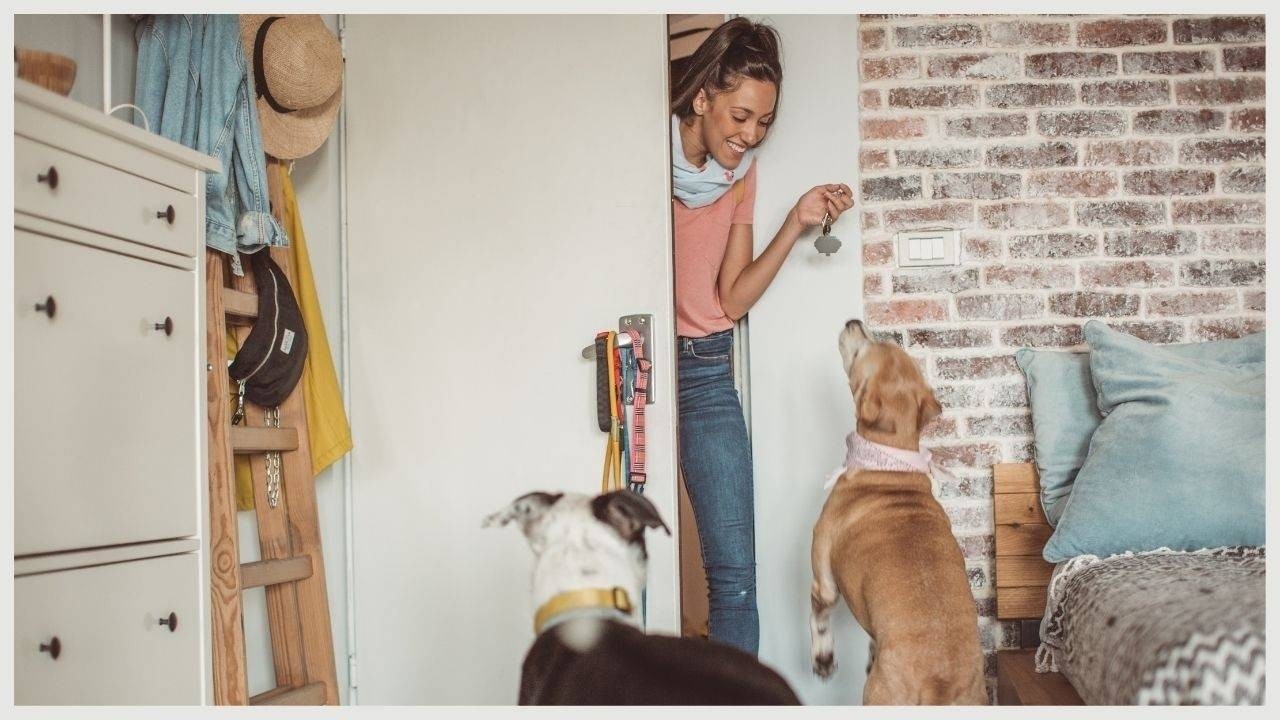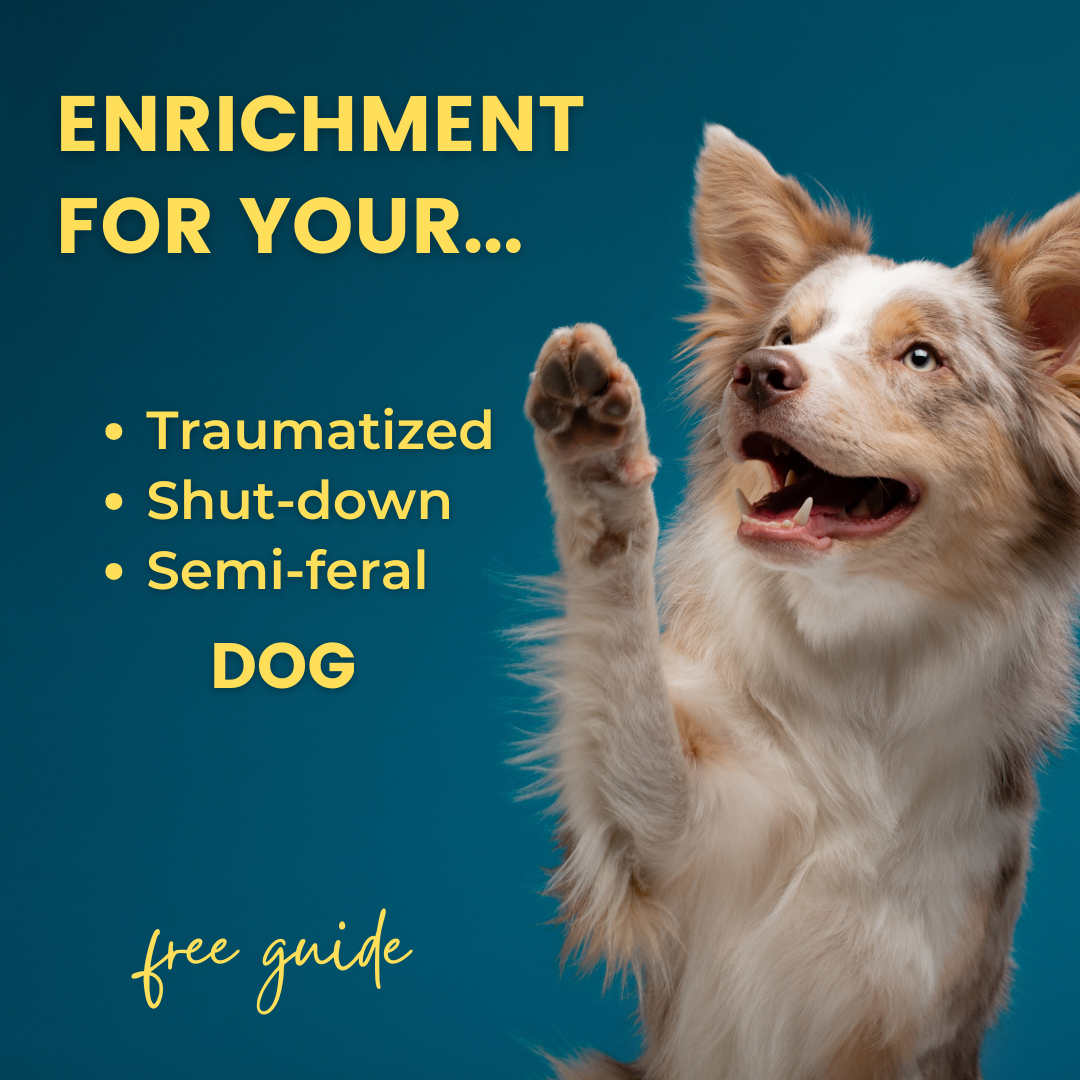Introducing your Fearful Dog to a Pet Sitter
Mar 07, 2022
If you have a fearful dog, you might be wondering if you'll ever be able to go on vacation again. Finding and introducing a fearful dog to a pet sitter successfully requires forethought and careful planning. In this video I discuss some of the resources available to you when choosing and introducing a pet sitter. Here are some of the key points:
Who Can Help With The Process?
You don't need to find and introduce a pet sitter to your fearful dog on your own. Lean on your dog's "support team" when tackling this challenge.
- Make a plan with your positive reinforcement trainer. Your trainer can help you develop & implement a plan to add a pet sitter or boarding facility to your dog's care team. They might also be a good source of pet sitter recommendations.
- Talk to your Vet or Veterinary Behaviorist to discuss if situational anti-anxiety medications can help your dog feel less stressed during the pet sitter introduction process, or while you're away.
What Types of Pet Sitters Are There?
There are a few different types of arrangements with pet sitters and boarding facilities that can care for your dog while you're away. Consider which might be the best fit for you and your dog:
- Pet sitter visits your home: Some dogs are more comfortable in a familiar environment, so having a sitter visit or stay at your home might be a good option.
- Pet sitter hosts your dog at their home: One advantage to this set up is that for some dogs, problem behaviors that occur at home are less likely to occur at the pet sitter's home.
- Boarding kennels: These kennels work like a hotel where your dog stays away from home. Your dog might receive less one-on-one attention at a kennel, but might also have more opportunities to socialize with other dogs.
- Veterinary Clinic: Some vet clinics also provide short term boarding in their kennels.
What Do You Need In A Pet Sitter?
When choosing the best care option for your dog, it is important to consider what you and your dog need from this arrangement.
- Does your dog need to stay at home? For some fearful dogs, being away from home be very stressful. Letting them stay home with a sitter may be a kinder option than boarding them elsewhere. Other dogs may be more comfortable with strangers when away from the home.
- Can your dog be around other animals? Boarding kennels, vet clinics, or pet sitters' homes will usually be hosting other animals in addition to your dog.
- Does your dog need overnight care? Not all sitters offer overnight care, so make sure to ask about this when contacting potential sitters.
- Can your dog be left alone? If your dog suffers from separation anxiety, it is important to look for a sitter or service that can provide care 24/7.
- Will the sitter need to give your dog medication? If your dog needs to be given medications, make sure that the caretaker has the necessary skills and experience to administer them.
- Will your dog need walks? If your dog has to be walked, make sure that the caretaker has the skills to do so safely. For some dogs, exercise and play in the yard could be enough. It's important to consider the level of handling skill needed if your dog is fearful, reactive, or aggressive.
How Do I Find A Sitter?
Finding a pet sitter for fearful or reactive dogs can be difficult, especially if you're worried about them meeting a new person. Here are some places to start looking:
- Family/friends who know the dog: Sometimes, the easiest option is having someone the dog already knows and likes stay with them.
- Local R+ trainers: Your own trainer or other positive reinforcement trainers near you may be able to provide suggestions for sitters or boarding.
- Friends with fearful dogs: If any of your friends have a fearful dog, they may be able to recommend their own sitter who they've used and liked.
- Local dog groups: Social media groups, dog parks, and training clubs may be able to provide suggestions. You should vet these suggestions carefully!
- Fear Free Directory: Fear Free has recently developed pet sitter and dog walker educational programs. Sitters who have completed their training can be found in their directory.
What Should I Ask A Potential Sitter?
Once you've identified a potential caretaker for your dog, you'll want to determine to the best of your ability whether they're a good fit for you . Some questions to ask:
- How many animals do you care for at once? This is most relevant when considering pet sitters who board dogs in their homes, but can be a good idea to ask boarding facilities as well. This can give you an idea about the ratio of caretakers to animals and thus how closely your dog might be watched.
- How do you keep animals separate if needed? If there will be multiple animals at the boarding location, ask what safety measures are in place to keep animals separate in case they don't get along.
- How do you choose your clients? What DON'T you work with? Animal care professionals should have clearly established criteria for which animals they will work with, and which require skills that are outside their area of expertise.
- How long will my dog be left alone? Even if your dog doesn't suffer from separation anxiety, they might find it stressful to be left alone, especially in an unfamiliar place, for hours at a time.
- Are you insured? Any animal care professional should carry liability insurance.
- What education do you have that is relevant to animal care? Knowing a potential pet sitter's background in dog health and behavior can help you decide if they are a good fit for your dog.
- What kind of updates/feedback do you provide while I'm away? Many kennels will livestream dog "condos", while pet sitters often send photo or video updates.
- Are you trained in CPR and first aid? There are many courses available to pet professionals, and a caretaker should be able to give you an idea of their emergency response capabilities.
- What is your protocol for emergencies? A professional should have procedures in place for bites, other injuries, or other medical emergencies and should be able to tell you what they entail.
- What are your training methods? Even if your pet sitter isn't a trainer, how will they respond if your dog "acts up"? Look for a pet sitter who will use methods you are comfortable with.
Helpful Training To Do Ahead Of Time
There are some behaviors that you and your trainer can teach your dog to make your dog's care a little easier on a pet sitter:
- Crate training: If your dog isn't afraid of confinement, training them to go to and settle quietly in their crate on cue can be very helpful to a pet sitter.
- Mat training: A verbal cue to go to a specific location can allow your pet sitter to move your fearful dog without touching them.
- Go out/come in on cue: Training your dog to go out to the yard and come back in on cue can make their care much easier for a pet sitter.
- Sit/stand for leashing/harnessing: Training your dog to perform a particular behavior, like a sit or a stand, to be leashed or harnessed can also be helpful. The behavior would need to be generalized to the pet sitter, and might be more difficult to generalize than the other behaviors in this list due to the invasive handling involved.
- Find it/treat scatters to move dogs: Teaching a "find it" cue can help a pet sitter use treats to move your dog around without touching or approaching them.
I hope you enjoy this week's video and find it helpful!
If you're looking for more one-on-one guidance with your fearful dog, check out our online training membership, the Reactive Dog Academy. For a more personalized plan, sign up for private training.
If you are working on care of your fearful dog, we want to hear about your successes or struggles. Join our Facebook group and post your questions or comments there, or email us at admin@dogkindtraining.com.



